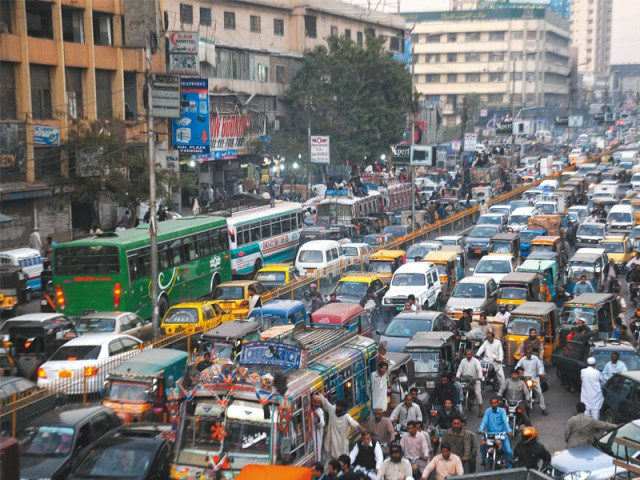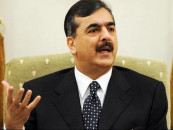Infrastructure engineering: Being stuck in traffic is costing Karachi $687m a year
NED experts study airport to Steel Mill junction route .

Traffic volume data for the paper, ‘Estimation of Traffic Congestion Cost - A Case Study of a Major Arterial in Karachi’, was collected at nine different points along the stretch from the airport to the Steel Mill junction. PHOTO: FILE
It is costing us $0.7 billion a year to be stuck in traffic in Karachi, roughly 2% of the city’s GDP.
This estimate is the first of its kind of research and was presented at the fourth international symposium on infrastructure engineering in developing countries organized by NED University at the Expo Centre December 26 to 28.
“Traffic congestion is leading to delays, has a monetary cost, [means] loss of business,” said Dr Muhammad Adnan. He added on other costs: environmental degradation, pollution, social fatigue. “It is intangible but what is traffic congestion costing us?”
He presented a paper, ‘Estimation of Traffic Congestion Cost - A Case Study of a Major Arterial in Karachi’ which he co-authored with Prof. Dr. Mir Shabbar Ali, Syed Muhammad Noman and Syed Fazal Abbas Baqueri of the department of Urban and Infrastructure Engineering at NED.

That artery was a stretch of the National Highway that passes through an urban and industrial area. This stretch is monitored by the city government, which is responsible for its maintenance as well. The route is very important for industrial traffic. They used data from it to estimate congestion costs for the whole city.
Traffic volume data was collected at nine different points along the stretch from the airport to the Steel Mill junction. The researchers measured this and travel delays with an indigenously developed vehicle mounted with four cameras. It recorded video and had a remotely controlled GPS-based vehicle position tracking system. The vehicle itself made test runs to measure travel time delays at various times during the day. This information was supplemented by spot speed surveys.
They calculated the value of time by asking commuters to help with a questionnaire. This way they could tell how people were traveling, how long it was taking and how long they were waiting in traffic. Fuel use was factored in for CNG, gasoline and diesel combined with its prices.

The traffic volumes per day for the stretch from the airport to Steel Mill junction. Vehicle occupancy refers to passengers.
The data showed that on this stretch the number of motorcycles was the highest - 3,419 per day. But they carried the least number of passengers (1.2). Public transport carried many more passengers (on average 38) but was fewer (1,334).
Cars were travelling the fastest at an average speed of 50km/hr but motorcycles were facing the least delays at just 4 min/vehicle. Trucks, ostensibly carrying goods, suffered the longest delays at 16.8 min/vehicle.
The researchers connected delays with traveling at less than 20km/hour, which is a safe speed for developing countries. “We discovered that the people using public transport have a low value of time,” said Dr Adnan. When it came to value of a commuter’s time, it emerged that car passengers were losing out the most with Rs87 per hour. People on public transport, in comparison, were losing out on Rs34 per hour.
In the end, they tabulated the data and factored in fuel etc. For the National Highway stretch being studied, the cost of being stuck in traffic came to around $0.53 million per kilometre per year.
The experts found that the operating cost was Rs1.8 million, vehicle operating cost Rs1.04 million and wear and tear cost was Rs104,200. This was rounded into Rs3,044,000 for the total cost of direct traffic congestion per day in rupees.
A simple extrapolation of this for the entire Karachi network of around 1,300km comes to $687 million per year. “This is equivalent to 2% of the total revenue of Pakistan and also 2% of the GDP contributed by Karachi,” said the authors.
“In Karachi there was no particular study on what is the cost we are losing,” said Dr Adnan, adding that if we knew at least policy makers would be able to do something about it.
The research was commissioned and funded by Indus Motors.
Published in The Express Tribune, December 27th, 2013.



















COMMENTS
Comments are moderated and generally will be posted if they are on-topic and not abusive.
For more information, please see our Comments FAQ